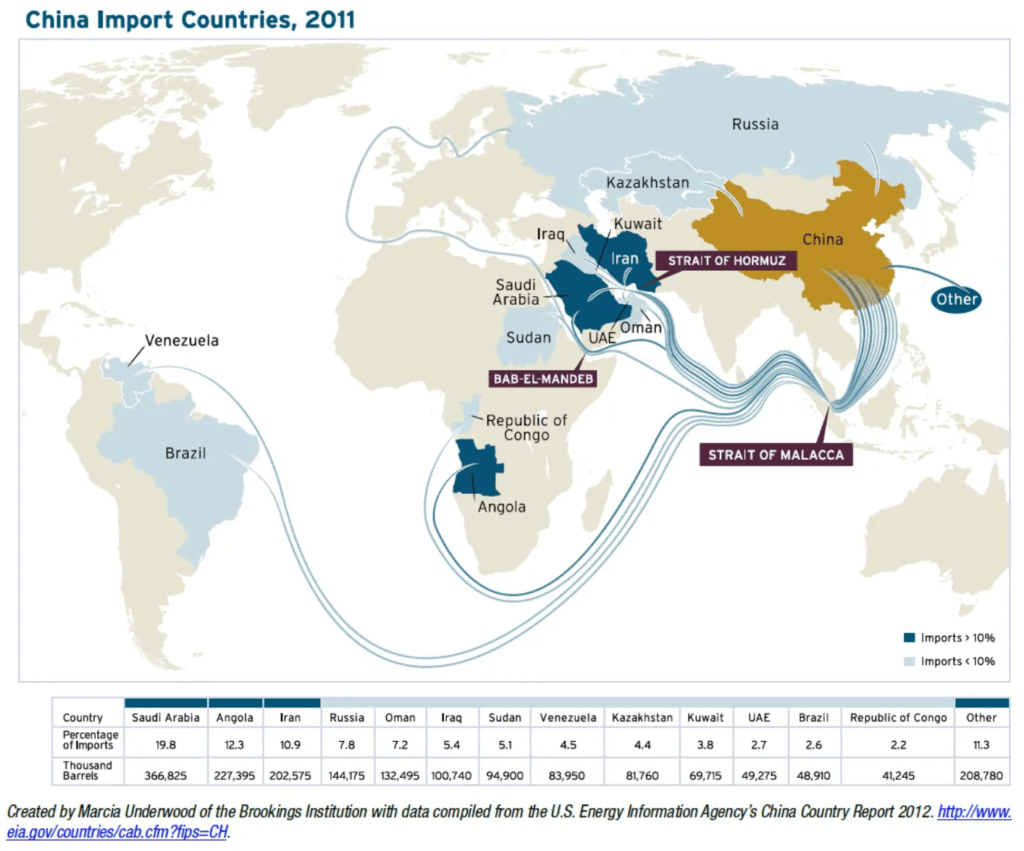The country in the world that has the hardest time accessing energy and has constant problems is the People’s Republic of China. The People’s Republic of China faces significant challenges to the security of its energy resources, creating a vulnerability that exceeds even that of Germany. According to its own data, China’s current supply network, which is more dependent on the Persian Gulf than Russia, is on the longest and most difficult trade routes in the world. Moreover, active conflict or pre-war tensions have already begun to emerge in these supply networks.
The end of US security commitments has led to the end of trade security along global sea-ocean routes, making civilian ships increasingly unsafe. This development, which I predicted in May 2023, makes the biggest contribution to the current global chaos. The lack of naval power projection capacity along critical trade routes leaves China susceptible to potential disruptions from other major players such as India and Japan in times of a real energy crisis.
As a matter of fact, China does not have the capacity to project naval power on any of the trade routes it uses to import its food and energy. Because its navy, unlike Japan, is not blue water (ocean) capable. So, when a real energy crisis occurs, India and Japan will not leave a drop of oil or a cylinder of LNG to China without taking every last drop of their needs.
After this, if the Southeast Asian countries start to cause problems, Chinese navies will probably not even be able to pass the first chain of islands surrounding them. Moreover, these countries will create more than just the problem when energy hunger occurs. In particular, Japan’s advantage is that its navy is extraordinarily strong compared to other countries; The advantage of India is that all this trade passes through the Indian cape.
Those who look at the Chinese navy only numerically may think that the navy is strong, but unfortunately, according to naval theory, this is not a healthy analysis. Navy is not just about quantity but also about quality. Countries must build navies according to their security needs and plan their resources accordingly. Unfortunately, the genie could not achieve this. One of the aircraft carriers was a casino (I’m not kidding, literally a casino) and the other was a copy of the first one. Moreover, neither of them are nuclear. Therefore, especially in terms of navy, Japan has the ability to make China California Roll in just days.
As for trade security, as we see in the Financial Times every day, things have already started to stir in Basra. The most dangerous thing is that Iran seizes new tankers every month. This was not even imaginable when the USA was in the region. They will soon receive a response from the Arab League because the current situation is not sustainable. If you examine the actions of the Saudis, I see that a harsh response is approaching, there will be a war here and only then will the world encounter the real energy crisis.
The energy that China receives from Russia, which Eurasianists consider safe, is not a cure for China, but the trade route they use has a ridiculous length. Currently, most of this energy trade goes around Europe, under Africa or through the currently war-torn Red Sea and back to the Indian Cape.

In a world where merchant ships can be seized even with an inflatable boat, if you think that these ships can pass energy-hungry European countries during a full-fledged energy crisis, you are very wrong. Land trade via Siberia is much more limited and is currently operating at full capacity, there will be other problems here too, but the scale is so small that it is not worth analyzing.
The reason for using ships is that they cannot go around the poles because there is ice most of the year. You need to put an ice-breaking nuclear ship in front of every commercial ship, this will already increase the prices to such a point that trade will no longer have any meaning. That’s why they have to use that difficult route around the world, and there are dozens of problematic points where they can get stuck, including Europe.
Now even small countries like Denmark or Finland could commandeer one of these ships. Sweden wouldn’t let a bird fly if it wanted to. Europe no longer insures these tankers anyway, due to sanctions.
Now think about it, if a poor, hungry small Yemeni tribe with weapons from the 1960s can disrupt world trade like this, what can countries with strong navies, modern weapons and every motivation because they are starving for energy do? In this process, China appears to be the most risky country. The most important reason for this is, as I said, the lack of energy security. I have doubts about whether they can even make it to 10 years.